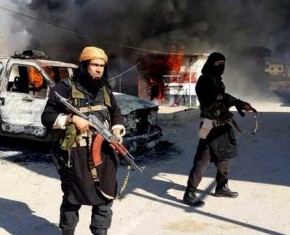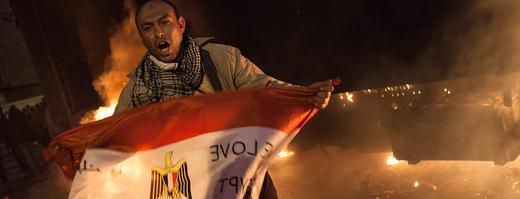The views expressed in our content reflect individual perspectives and do not represent the authoritative views of the Baha'i Faith.
…Wherefore we commanded the children of Israel, that he who slayeth a soul, without having slain a soul, or committed wickedness in the earth, shall be as if he had slain all mankind: but he who saveth a soul alive, shall be as if he had saved the lives of all mankind. Our apostles formerly came unto them, with evident miracles; then were many of them after this, transgressors on the earth. – Qur’an 5:32.
This Qur’anic verse is my answer to the question of whether Islam is inherently violent—a question prompted by horrific acts of murder and terror being committed in the name of Allah as we speak.
On a close reading, the answer this verse provides turns out mixed. Despite the supreme value it places upon human life, Islam makes an exception: “he who slayeth a soul, without having slain a soul, or committed wickedness in the earth (fasād fi-l-arḍ).” Islam is not a pacifist religion, and in some cases it defines warfare and corporal (including capital) punishments as just.
Getting more specific on the question of Islam and violence requires delving into the various Islamic schools of thought. One gets different answers depending on which of these schools one consults—although the traditional Islamic schools broadly agree that terrorism and vigilantism are themselves “wickedness in the earth.”
Surprisingly to some people in the West, this situation doesn’t differ much from Christianity. We can identify “the Christian” answer to only a few very general questions, but the specifics of belief and practice, and even the particular view of justifications for violence and war, often look quite different from one sect or denomination or tradition to another.
To an outside observer, which one is the “true” interpretation?
As a Baha’i, I believe that the Baha’i teachings contain the true interpretation, explained logically and clearly by the Baha’i principle of progressive revelation. Progressive revelation shows us that all religions, over time, eventually become reflections of human frailty and worldly ambition, leading to the distortion of the original message. That distortion then corrupts the peaceful, spiritual intent of the original messengers and founders of the great Faiths—and results in the progressive revelation of the next great Faith. If you really want to know what Muhammad (or Jesus, or the Buddha) taught, I’d recommend checking what the Baha’i Writings say they taught, comparing it with their surviving scriptural records, and building from there.

Unfortunately, a few people look to the actions of a small minority of Muslim extremists, and the oppressive governments loudly claiming to represent Islam today, and wonder if Islam can even fit into the idea of progressive revelation at all. There was Abraham, there was Moses, there was Jesus—but did something go wrong after that? Is Islam inherently more violent than previous religions such as Judaism and Christianity? The answer to this, I believe, is clearly “No.”
All three religions prescribe an all-encompassing way of life that does not, at least in theory, recognize any impermeable boundary between church and state (a fairly modern idea). All three religions can, and have, employed force, even deadly force, in pursuit of religious goals.
Traditional accounts of Islamic Law (sharī‘a) don’t define any more capital crimes than the Jewish Torah or the Christian canon-law informed European law codes of the Middle Ages—arguably even fewer. They allow for more individual freedoms, such as divorce and remarriage, conducting business on the Sabbath, and for Jews and Christians to continue practicing their faiths. The case can be made that the original teachings of Islam permit inherently less violence than its predecessors, not more.
For example, the Islamic institution of dhimma—whereby members of certain past religions could practice their faith and obtain exemption from military service in an Islamic state in exchange for paying a tax—is widely condemned for its abuses today, but originally advanced the rights enjoyed by religious minorities under medieval Christian states. Being a dhimmi under Islam was certainly a better option than facing the torture implements of the Holy Inquisition, and the new law led to mass emigrations of Jews from Europe to Islamic lands.
Some Christians protest that these things had nothing to do with the peaceful teachings of Christ—that the Church-led crusades, pogroms, and conversions by the sword throughout Europe, the Americas and elsewhere weren’t “really Christian.” They then make the same argument as most Muslims—that terrorism and bloodshed do not represent real Islam. Both are probably right.
Christ taught loving one’s enemies and returning good for evil (as did Muhammad—Qur’an 41:34; 7:199; 60:7). Yet Christ also said, “he that hath no sword, let him sell his garment, and buy one” – Luke 22:36. St. Paul described the pagan Roman empire as “the minister of God to thee…he beareth not the sword in vain: for he is the minister of God, a revenger to execute wrath upon him that doeth evil.” – Romans 13:4. These words seemed to apply all the more after the Roman emperor Constantine became a Christian. The human tendency to resort to violence to solve problems made it inevitable that Christ’s prediction, “I came not to send peace, but a sword” (Matt. 10:34) would be fulfilled literally, abundantly and for centuries in the acts of his followers. Despite the peaceful teachings of Christ, the Bible contains no statement of the freedom of conscience quite so direct as the Qur’an’s:
There is no compulsion in religion. The right direction is henceforth distinct from error. And he who rejecteth false deities and believeth in Allah hath grasped a firm handhold which will never break. – Qur’an 2:256.
This omission made it easy for the Church to hand over Jews, Muslims, heretics and rebels to the arm of temporal power, to receive hellish punishment in this world for their perceived sins.
Why is it that today we see so much religiously motivated oppression in Islamic lands, and comparatively little in Christian majority countries? Perhaps we should look for the answer in history rather than theology. Perhaps, too, we should look to the newest and most progressive of the world’s global religions, the Baha’i Faith, for fresh spiritual guidance on the question of wars and violence:
Let none contend with another, and let no soul slay another; this, verily, is that which was forbidden you… What! Would ye kill him whom God hath quickened, whom He hath endowed with spirit through a breath from Him? Grievous then would be your trespass before His throne! Fear God, and lift not the hand of injustice and oppression to destroy what He hath Himself raised up; nay, walk ye in the way of God, the True One. – Baha’u’llah, The Most Holy Book, p. 45.
You May Also Like
Comments

















Abdu'l-Bahá, The Secret of Divine Civilization
Shoghi Efendi
-Shoghi Efendi
Where was Christianity about 1400 years after its founding? Not yet emerging from the Dark Ages. And starting off on the Spanish Inquisition to enforce orthodoxy. Does anyone see any parallels here?
Continuing revelation was needed in the past because of at least two things: (1) a general tendency to lose sight of the original message and even to subvert it, and (2) the fact that the pure, original message itself was addressed to a particular stage in human history.
The ongoing guidance through the Universal House of Justice means that (1) does not apply to the Baha'i Faith as a whole..."This is the Day that shall not be followed by night..." So I should have written that "progressive revelation shows us that all religions *of the past* eventually became ...reflections of human frailty..."
In the eyes of an agnostic, just claiming this might not be terribly reassuring. It requres study of the Covenant and the history of the Faith to understand what makes the Baha'i Faith different. But, point taken!
Thanks for reading and for this astute observation.
Dan
(Shoghi Effendi, World Order of Bahá'u'lláh, p. 117)